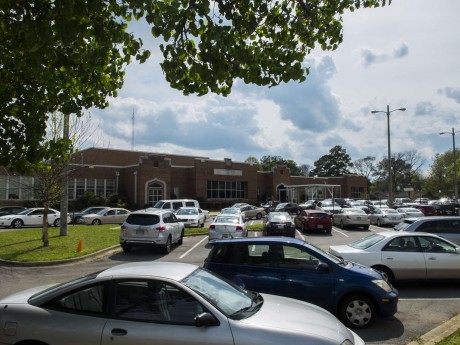Next Tuesday, Feb. 10, voters who live in the city of Birmingham will have the opportunity to approve or reject a proposed increase in their property taxes. If approved the measure will increase taxes by three mills, meaning that a property owner’s annual tax bill will increase by $30 — or $2.50 per month — for every $100,000 of the property’s assessed value.
The proceeds from the tax increase will be used to fund numerous curriculum enhancements in the Birmingham City Schools. The referendum in Birmingham follows successful efforts to raise taxes for education in the municipalities of Midfield, Trussville and Vestavia Hills.
In advance of next week’s vote, Weld spoke with Randall Woodfin, the president of the Birmingham Board of Education. The following are excerpts from that conversation.
Weld: Let’s start by talking about what is included in the referendum.
Randall Woodfin: The three-mill property tax increase will generate $7.8 million. One hundred percent of that will go into our classrooms. That includes putting a pre-K class at every elementary school — and for those schools that already have a pre-K, we will add an additional class.
We also want to put a band program, an art program and a music program back in every school, K through 8. We want to make sure that the ninth- through twelfth-grade programs that now exist, at a minimum at the band level, will be robust, as they once were, allowing our students to not only be competitive at the high school level, but to have the opportunity to receive college scholarships for those programs. Finally, we’re looking to expand our career academies and increase foreign language learning opportunities. Again, 100 percent of this additional funding will be spent in the classroom.
Weld: How are these extracurricular programs important to the overall educational mission?
RW: That’s easy. Extracurricular, co-curricular, whatever you choose to call it, the investment we make in a child’s natural talents at an early age does so much for that child as an individual. And we know that when a school offers opportunities for student participation, you also receive increased parental participation. That’s when you start to see the morale of the school, the energy, the culture, the sense of school as a safe and secure and nurturing environment, all move onto an upward track. The simplest way to put that is school spirit.
We also know that investment in co-curricular programs strengthens student performance in the core curriculum. It contributes to skills like problem-solving and team-building, things that provide a return to the student and to the system as a whole.
Weld: What about the timing of the referendum? Is there any issue with its taking place in the middle of the school year, and was it made tricky at all by the resignation of Superintendent Craig Witherspoon back in October?
RW: Not at all. Our conversation about it began as soon as this board took office, and it actually had started even prior to that. Dr. Witherspoon had conversations with Mayor Bell when the city was preparing to do the bond referendum [in 2012] about including it then, but that did not happen.
What we realized when we came to the table was that not only is our dependency on state funding short-sighted, with 60 percent of our budget coming from the state, but we have not added any additional local funding in more than 20 years. Not to mention that despite stabilizing our student population, we’re going to continue to see decreases in state funding, because for our state government, education is just not a priority.
Here’s the other thing about the timing: If this referendum passes next week, we will not realize these additional dollars until January of 2016, when property taxes start coming into the coffers. That’s in the middle of both a school year and a budget year. The next budget will not go into effect until October of 2016, so realistically, we won’t begin to see the impact in the classroom until early in 2017. There’s never a perfect time to do it — but by the same token, there’s never a wrong time to do something that is going to benefit our students and our school system. We have an opportunity here to do something, and we don’t need to delay it.
Weld: What has been the board’s campaign strategy? Up to now, the referendum seems to have flown somewhat under the radar, at least in terms of paid advertising.
RW: You’ll see it over this last week. We had limited resources to get the word out. We got an opinion from the attorney general on how we’re allowed to go about promoting a tax increase. We’re not a school system with a lot of money, so we have been hoarding the little we can allocate to this, and now we’re trying to blanket the city as best we can. That’s direct mail, radio and TV. The first direct mail piece went out this past weekend to about 16,000 households, and there will be three more mailings. Radio and TV starts tomorrow [Feb. 3]. We’ve also been attending neighborhood meetings to promote it and hopefully get people to buy into it.
Weld: What kind of feedback have you had?
RW: Feedback has been supportive. I think people are appreciative of the direction the school system is going. We’ve been talking about things like the fact that the graduation rate is up to 79 percent, when it was 56 percent four years ago. Is a 79 percent graduation rate something to brag about? Absolutely not. But it does help us appreciate where we’ve come in four years. We have a long way to go, but it’s good to pause and acknowledge and appreciate that our system is moving in the right direction.
Another thing we talk about is that we’re not bleeding administrative costs anymore. Those costs are now 3.5 percent [of the total budget], which is well below the state’s recommendation of 5 percent. Our legal costs are now in order. The brick-and-mortar phase of construction has come to an end. There is nothing more to focus on and/or spend money on except additional classroom units. When you put it to people like that, what I’ve heard in response is, “Our generation had these kinds of programs when we were in school, and this generation deserves the same opportunities.” And I think they’re willing to pay the extra $1.83 per month that this tax will cost the average household to have those programs in our schools.
Weld: Still, there is some skepticism about the school board, and about tax increases in general. Have you encountered that, and what has been your response?
RW: I understand the desire for accountability, so I will repeat that this board has greatly reduced administrative costs and legal fees. I think that shows that we understand the need to spend money wisely, and that we want to be held accountable. We have public meetings before our budget is voted on, and you can go on our website right now and see, per dollar, what we’re spending our money on. We believe in transparency, and we want the residents of our community to know what we’re doing with their investment in education.
Weld: At this stage, how much of the negative image of the Birmingham City Schools is based in reality, and how much is purely perception, based on years of decline?
RW: When it comes down to this whole notion of a safe, secure, nurturing environment, I think it’s mostly perception. I encourage anybody to walk into one of our schools. If you do, you’re going to find a place that is peaceful and orderly, a place where teaching and learning is going on. We’re battling perception, and as a board, we recognize that changing the perception starts from the top down, in the way we treat each other and address issues and solve problems.
The other piece is tangible. It’s actual results: graduation rates, ACT scores, students being able to read and do math on their grade level. That’s all visible to us. Our grades are not where they ought to be. Our graduation rate is better, but we can do better. We have to own that, and also be able to pivot to innovative and creative ways to make sure that we’re yielding results that work for our children.
Weld: How difficult is it to get people to be patient about that?
RW: It’s difficult — but they should be impatient. We just want them to channel that impatience into supporting things that make the system better, including the things that they need to do to help their child succeed.
Weld: How is the search for a new superintendent proceeding?
RW: It’s on track. The orderly transition with the prior superintendent allowed us to take our time with our process, in terms of getting input from the public, identifying the right interim person and positioning ourselves to get the right person for the long term.
Weld: Does this decision, the hiring of a new superintendent, and the way that plays out once that person is on the job define this board?
RW: We cleared two huge hurdles by getting out from under state intervention and accreditation probation. But I have to say that getting additional local revenue through this referendum and finding the best superintendent for the Birmingham City Schools will define this board, absolutely. Those two issues are the defining moment for leadership of the system and the direction of the system. It’s critical that we get it right.





